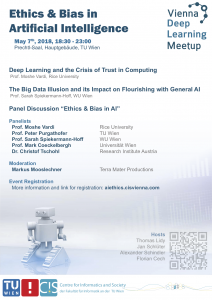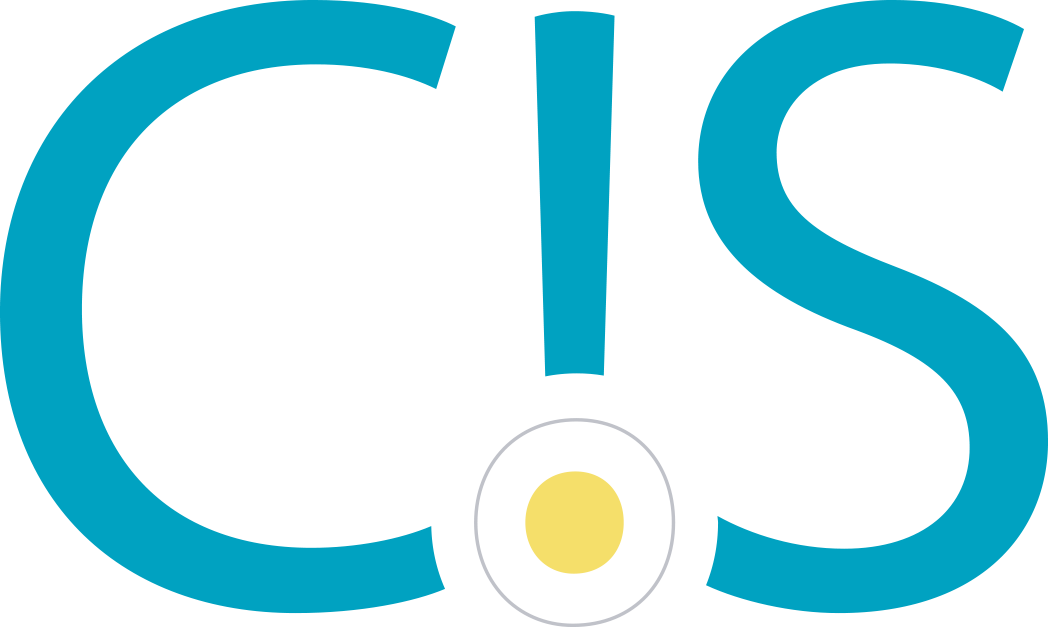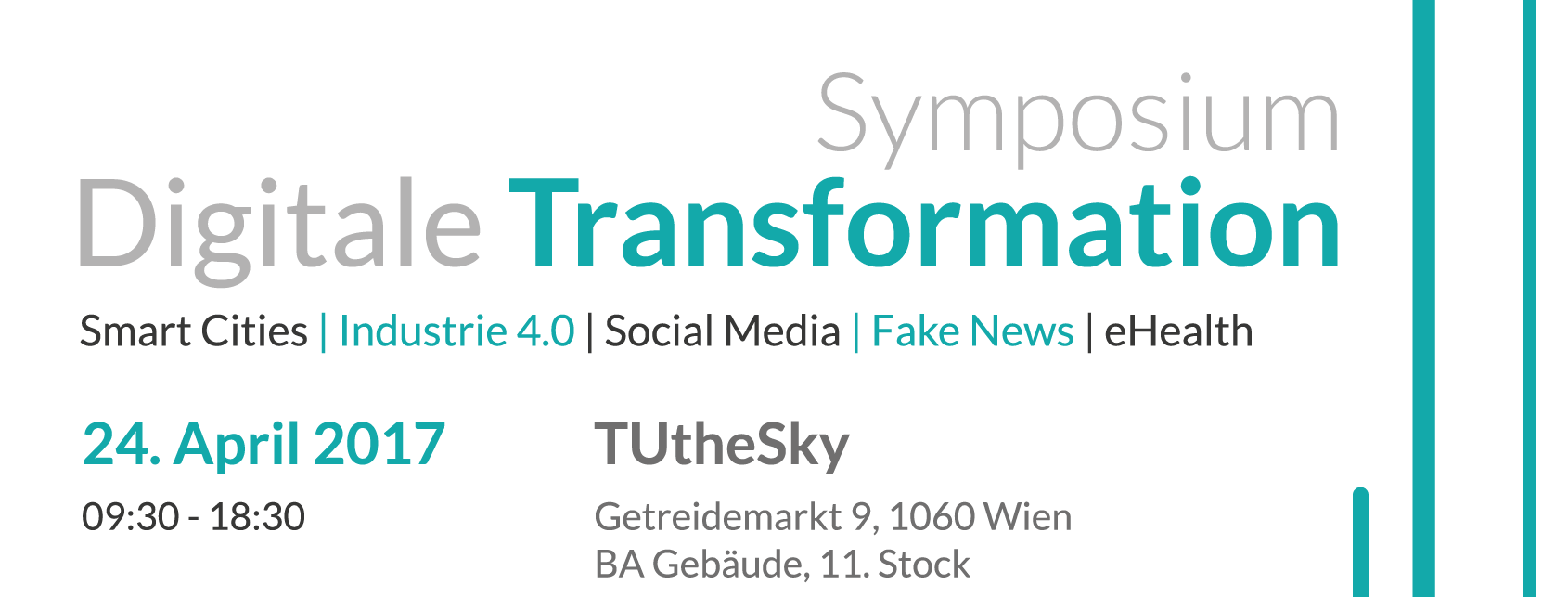Florian Cech: AMS Algorithm and Accountable Systems Workshop
Join us on April 2nd from 15:00 to 17:00 at the Privacylab, WU Vienna for a workshop on the AMS Algorithm and Accountable Systems!
This meeting of the Lab working group on accountable systems will discuss issues related to understanding the AMS algorithm, with a short introduction by Florian Cech from TU Wien to set the scene.
Previous workshops on accountable systems are listed here include: https://privacylab.at/event/csh-workshop-developing-accountable-systems/
Dr. Astrid Mager: Visions and values in European search engine design [Lecture]
The Centre for Informatics and Society (C!S) is inviting you to a lecture by Dr. Astrid Mager as part of our fall lecture series Aspects of the Digital Transformation.
Abstract
“What motivations, value systems, and visions guide the development of European search engines? How do these imaginations get translated into sociotechnical design practices? What negotiations, compromises and power dynamics may be observed? How do place and cultural context matter in the development of search engines? These are the questions to be discussed in my talk by drawing on my ongoing research on European search engines.
Building on my previous work on the shaping and governing of corporate search engines (Google) and their “algorithmic ideology”, I will focus on three so-called alternative search engines: The privacy-friendly search engine StartPage (NL), the initiative Open Web Index (D/EU), and the peer-to-peer search engine YaCy (D). Drawing on a first analysis of online materials, qualitative interviews and a half-day workshop conducted with the developer teams, I will discuss visions and values driving European search engines, challenges developers encounter in their daily work practices, and consequences these pose in terms of “social innovation”.
About the speaker
Astrid Mager is a senior post-doc at the Institute of Technology Assessment, Austrian Academy of Sciences. She is currently working on her habilitation project „Algorithmic Imaginaries. Visions and values in the shaping of search engines“.
Information
Time: January 21st, 2019 @ 17:00
Location: Kontaktraum – TU Wien
Neues EI, 6th floor
Gußhausstraße 27-29
1040 Wien
Due to limited space, we ask you to sign up for the event at dt@cisvienna.com.
The lecture is free, open to the general public and will be held in English.
Questions and discussion with the speakers are encouraged after the lectures, and refreshments will be provided after the lectures as well.
For general information about the lecture series, visit http://lectures.cisvienna.com
Prof. Klaus Kornwachs: Data – Interests – Ontologies: How business models distort science [Lecture]
The Centre for Informatics and Society (C!S) is inviting you to a lecture by Prof. Klaus Kornwachs as part of our fall lecture series Aspects of the Digital Transformation.
Abstract
The new possibilities of Big Data and Artificial Intelligence Technologies allow finding unexpected structures and relations in data sets, generated in different fields and contexts. This can be done either to figure out new scientific hypotheses or to find relations which can be used to establish new business models.
A result generated by Big Data or AI can only be interpreted meaningfully by knowing the original research question. Thus, a model with a pre-theoretic hypothesis is necessary. Nevertheless one can find the tendency to substitute the scientific methods by pure numerical methods. This tendency is driven by the development of business models that aims to market a multifunctional use of data once collected in a wide variety of contexts. Some examples in the field of Human Resource Management will be given. It can be shown that the use of such procedures is not reliable. Such procedures should be used in a way that supports decisions, not to automate or substitute them.
About the speaker
Klaus Kornwachs is a permanent Honorary Professor for Philosophy at University Ulm, Germany since 1990, and a member of the German Academy for Science and Engineering. He held the Chair for Philosophy of Technology at Brandenburg Technical University of Cottbus from 1992 to 2011. He studied Physics, Mathematics and Philosophy, and won 1991 the Research Award for Technical Communication of the Alcatel-SEL Foundation. He was Guest Professor at Vienna, Budapest and Dalian. His main fields in research are philosophy of technology, analytical philosophy, philosophy of sciences and general system theory. For publications see http://kornwachs.de.
Information
Time: December 10th, 2018 @ 17:00
Location: Kontaktraum – TU Wien
Neues EI, 6th floor
Gußhausstraße 27-29
1040 Wien
Due to limited space, we ask you to sign up for the event at dt@cisvienna.com.
The lecture is free, open to the general public and will be held in English.
Questions and discussion with the speakers are encouraged after the lectures, and refreshments will be provided after the lectures as well.
For general information about the lecture series, visit http://lectures.cisvienna.com
Prof. Ehud Shapiro: Computational Foundations for e-Democracy [Lecture]
The Centre for Informatics and Society (C!S) is inviting you to a lecture by Prof. Ehud Shapiro as part of our fall lecture series Aspects of the Digital Transformation.
About the speaker
Ehud Shapiro is a multi-disciplinary scientist, artist, and entrepreneur. A Professor of Computer Science and Biology at the Weizmann Institute of Science with an international reputation, he made fundamental contributions to many scientific disciplines including machine learning, inductive inference, algorithmic debugging, logic programming, concurrent programming, molecular computers, molecular programming, synthetic biology, single-cell genomics, social choice theory and foundations of e-democracy.
Ehud was also an Internet pioneer and a successful Internet entrepreneur, founding Ubique Ltd., perhaps the first Internet social networking software company. Ehud is a recipient of the World Technology Award for Biotechnology and a member of “Scientific American 50” as a Research Leader in Nanotechnology. Ehud is a Bass singer and performed in Israel and abroad, including as a soloist at Carnegie Hall.
Information
Time: November 12th, 2018 @ 17:00
Location: Zemanek HS – TU Wien
Ground Floor
Favoritenstraße 9-11
1040 Wien
Due to limited space, we ask you to sign up for the event at dt@cisvienna.com.
The lecture is free, open to the general public and will be held in English.
Questions and discussion with the speakers are encouraged after the lectures, and refreshments will be provided after the lectures as well.
For general information about the lecture series, visit http://lectures.cisvienna.com
Prof. Gerhard Fischer: Exploring Design Trade-Offs for Quality of Life in Human-Centered Design [Lecture]
The Centre for Informatics and Society (C!S) is inviting you to a lecture by Prof. Gerhard Fischer as part of our fall lecture series Aspects of the Digital Transformation.
Abstract
Creating a transformative framework to foster, nurture, and support “Quality of Life (QoL)” is one of the most challenging design problems of the digital age. QoL is a broad concept without a precise, generally accepted definition. In design, trade-offs are universal because there are no best solutions independent of goals, objectives, and values, specifically for systemic, ill-defined, and wicked problems such as QoL.
Grounded in research activities from a broad spectrum of different disciplines and an analysis from our research over the last two decades, this presentation will explore specific design trade-offs. The insights and arguments are summarized in requirements for the design of socio-technical environments to address future challenges for human-centered design grounded in a QoL perspective.
About the speaker
Gerhard Fischer is a Professor Adjunct and Professor Emeritus of Computer Science, a Fellow of the Institute of Cognitive Science, and the Director of the Center for Lifelong Learning and Design (L3D) at the University of Colorado at Boulder. He is a member of the Computer Human Interaction Academy, a Fellow of the Association for Computing Machinery, and a recipient of the RIGO Award of ACM-SIGDOC. In 2015, he was awarded an honorary doctorate from the University of Gothenburg, Sweden.
His research has focused on new conceptual frameworks and new media for learning, working, and collaborating, human-centered computing, and design. His recent work is centered on quality of life in the digital age, social creativity, meta-design, cultures of participation, design trade-offs, and rich landscapes for learning.
Video of the lecture
Information
Time: October 22nd, 2018 @ 17:00
Location: Kontaktraum – TU Wien
Neues EI, 6th floor
Gußhausstraße 27-29
1040 Wien
Due to limited space, we ask you to sign up for the event at dt@cisvienna.com.
The lecture is free, open to the general public and will be held in English.
Questions and discussion with the speakers are encouraged after the lectures, and refreshments will be provided after the lectures as well.
For general information about the lecture series, visit http://lectures.cisvienna.com
Ethics & Bias in Artificial Intelligence
 The Vienna Deep Learning Meetup and the Centre for Informatics and Society invite you to an evening of discussion on the topic of Ethics and Bias in AI. As promising as machine learning techniques are in terms of their potential to do good, the technologies raise a number of ethical questions and are prone to biases that can subvert their well-intentioned goals.
The Vienna Deep Learning Meetup and the Centre for Informatics and Society invite you to an evening of discussion on the topic of Ethics and Bias in AI. As promising as machine learning techniques are in terms of their potential to do good, the technologies raise a number of ethical questions and are prone to biases that can subvert their well-intentioned goals.
Machine learning systems, from simple spam filtering or recommender systems to Deep Learning and AI, have already arrived at many different parts of society. Which web search results, job offers, product ads and social media posts we see online, even what we pay for food, mobility or insurance – all these decisions are already being made or supported by algorithms, many of which rely on statistical and machine learning methods. As they permeate society more and more, we also discover the real world impact of these systems due to inherent biases they carry. For instance, criminal risk scoring to determine bail for defendants in US district courts has been found to be biased against black people [1], and analysis of word embeddings has been shown to reaffirm gender stereotypes because of biased training data. While a general consensus seems exist that such biases are almost inevitable, solutions range from embracing the bias as a factual representation of an unfair society to mathematical approaches trying to determine and combat bias in machine learning training data and the resulting algorithms.
Besides producing biased results, many machine learning methods and applications already in use today raise complex ethical questions. Should governments use machine learning and AI methods to determine the trustworthiness of their citizens (cf. [3])? Should the use of algorithmic systems that are known to have biases be tolerated to benefit some while disadvantaging others? Is it ethical to develop AI technologies that might soon replace many jobs currently performed by humans? And how do we keep AI and automation technologies from widening society’s divides, such as the digital divide or income inequality?
These and many more questions and issues need a broad and multidisciplinary discussion to ensure a fair and overall beneficial future of AI and related technologies. This event aims to provide a platform for debate in the form of two keynotes and a panel discussion with five international experts from numerous scientific fields.
This event has already happened. Watch the recording of the live stream, or take a look at the photos!
“Future of the Digital Transformation” – Research Study Presentation
The Centre for Informatics and Society (C!S) of the Faculty for Informatics at the TU Wien invites to a presentation of a research study based on the Delphi method focusing on the future of the Digital Transformation.
The C!S was founded in 2016 with the mission to investigate the issues and questions arising between academic research, technological advancements and the challenges and consequences society faces due to those developments.
The current study was conducted during the last months of 2017 and investigates consequences, challenges and future prospects of the Digital Transformation with an interdisciplinary approach based on the participation of a number of international experts from a variety of academic disciplines. The goal of this Delphi study was to determine whether a group of experts can come to a consensus regarding which areas of society will be most affected by the Digital Transformation, which technologies will be most relevant to that change and which issues introduced by those technologies and their widespread use require particular attention.
The results of the study will be presented to the audience in an easily accessible way. Following this, a moderated panel of representatives from politics, business, academia and public administration will help start a broad conversation about the results of the study specifically as well as general future prospects for the Digital Transformation in general.
The event will be held in German.
Symposium “Digital Transformation”
The Centre for Informatics and Society (CIS) of the Faculty of Informatics at the TU Wien invites you to the symposium “Digital Transformation”.
Smart Cities, Industrie 4.0, Social Media and Fake News – digital transformation affects nearly all aspects of our daily lives. Future developments can no longer be examined through any single academic discipline: only a broad, interdisciplinary approach will allow us to develop solutions and answers to the challenges posed by the increasing digitalisation of society.
Following the Vienna University of Technology credo ‘Technology for People’, the Centre for Informatics and Society investigates developments within the intersection of society and informatics, supports research efforts across academic disciplines and facilitates an open discourse through workshops, talks and public events.
International expert academics from a diverse number of fields – including social informatics, sociology, communication sciences, industry and production management, education / media pedagogy and economy – give insights into aspects of digital transformation within their disciplines. Their talks elucidate the status quo of digital transformation in their fields and provide an outlook on the challenges and opportunities for academic research and higher education, politics and society at large in the coming years.
We are particularly delighted to welcome the Austrian State Secretary for Administration and Public Service, Diversity and Digitalization, Mag. Muna Duzdar, as keynote speaker.
Talks
“Health, Technology, and Automation: Connecting Personal Health, the Health Sector, and Society”
Prof. Eric T. Meyer, Oxford Internet Institute, UK
Eric Meyer is Professor for Social Informatics and the Oxford Internet Institute. His research is focused on the changing nature of knowledge creation in science, medicine, social science, arts, and humanities as technology is embedded in everyday practices.
“Democracy in a Networked Society”
Prof. Jan van Dijk, University of Twente, Netherlands
Jan van Dijk is Professor for Sociology and Communication Sciences and the chair of the Centre for eGovernment Studies at the University of Twente. He investigates aspects of the information society in regards to communication, democracy and technology.
“Manufacturing Work of the Future”
Dr.-Ing. Sebastian Schlund, Fraunhofer IAO, Stuttgart, Germany
Sebastian Schlund is the Head of the Competency Centre for Production Management at the Fraunhofer Institute for Industrial Engineering in Stuttgart, Germany. His areas of interest include practical research into production methods of the future, Industry 4.0, integrated planning and optimisation of industrial production and logistics as well as age-appropriate workplace systems.
“Transforming the Digital by Media Education”
Prof. Christian Swertz, University of Vienna
Christian Swertz is Professor for Media Pedagogy at the University of Vienna. He investigates aspects of education theory and media competency, technology-enhanced learning / eLearning as well as the relationship between digital media and education.
“Digital Transformation in Political Economy” (tbd)
Prof. Gerhard Hanappi, TU Wien
Gerhard Hanappi is Professor at the TU Wien and the ad personam Jean Monnet Chair for Political Economy of European Integration. His research includes the topics macro-economics, simulations, game theory and electronic commerce.
Slides
As announced at the Symposium, the presentation slides are available for download:
Van Dijk – Digital Democracy in a Network Society
Meyer – Health, Technology and Automation
Schlund – Manufacturing Work of the Future
Swertz – Transforming the Digital by Media Education
Hanappi – Digital Transformation and Political Economy
Photogallerie
Event Details
Date: Monday, 24th of April, 2017, 09:30 a.m. until 6:30 p.m.
Location: TUtheSky, Getreidemarkt 9, 1060 Vienna, BA Building, 11th floor
Free Entry
Following the talks, a moderated panel of our speakers will explore differences and commonalities across the fields, and give the audience the opportunity to actively engage the panelists through questions.
The day’s program will be accompanied by a business lunch, coffee breaks as well as a warm buffet and drinks with the panelists for an opportunity for informal talks after the panel.
The event will be held in English.
Due to limited space we would appreciate a short note if you plan on attending via email to symposium@cisvienna.com


